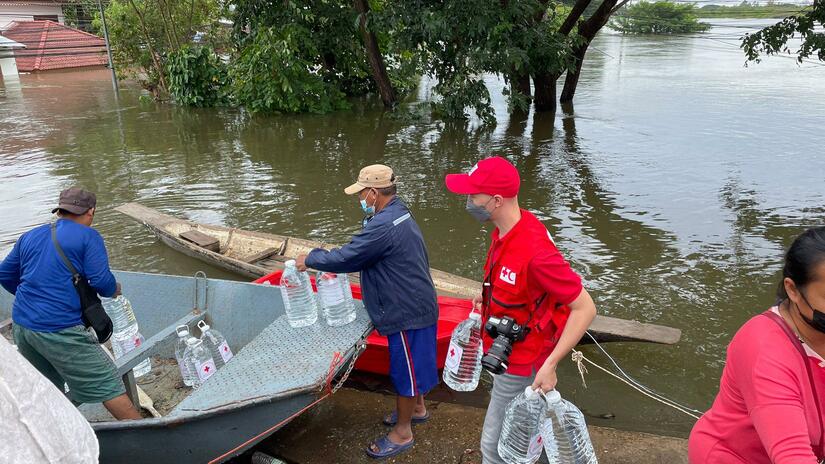Kuala Lumpur, 27 October 2022 – After unprecedented floods continue to hit many parts of Asia, dangerous un-subsiding flood waters are now the crisis, the International Federation of Red Cross and Red Crescent Societies (IFRC) warns. Men, women, and children are being forced to live out their day-to-day lives in dirty, stagnated water, and are at risk of deadly diseases such as malaria, dengue, cholera, and diarrhoea, not to mention long-term harmful effects to their bodies.
This year's monsoon season in the region saw more than 42 million people being severely hit by floods, landslides, and torrential rains since August. Moreover, this number only includes records from Bangladesh, Sri Lanka, Nepal, Pakistan, Thailand, Vietnam, Lao, and Cambodia.
Erratic and early rains triggered often unprecedented floods, damaging homes, livestock, infrastructure and more. Many weeks later, the flood waters have not receded.
Joy Singhal, IFRC’s Regional Head, Health, Disasters, Climate and Crisis, said:
“Stagnation of water, muck and mud following floods is a thriving breeding ground for mosquitoes, bacteria, and other harmful organisms. If left unattended to, this will trigger surges in infectious diseases.
“Prolonged water stagnation also causes lasting damage to water supplies and infrastructure, threatening the health of communities long into the future.”
Flood waters bring in substantial amounts of dirt and garbage into homes, schools, and infrastructure. Even if some volume of the water dissipates, torrential rain continues, and the waters rise again.
Many people have resorted to staying longer in shelters than usual. Emergency shelters have had to be relocated numerous times due to rising waters. Some areas, especially in South Asia, reported that the water took almost two months to subside, while most took weeks. This also poses the threat of being infected with COVID-19, as evacuation sites are often crowded and without proper ventilation.
Alexander Matheou, IFRC’s Asia Pacific Regional Director, said:
“Our teams across the region are reporting grave concerns for communities now facing the often-unseen crisis that follows in the wake of such devastating floods.
"Across the length and breadth of Asia, our health and relief teams are reporting severe repercussions of stagnating waters. People have nowhere to go and are forced to live in dangerous conditions.
“These unmoving waters pose a huge hindrance to communities relocating back to their homes, and therefore prolongs displacement. Not to mention devastating impacts to livestock, agriculture, shelter repairs and further increasing economic hardships, eventually preventing them from heading back to lead normal lives.”
The IFRC have launched emergency appeals multiple times this year to support Red Cross Red Crescent activities across the region for the humanitarian issues arising from the floods, with a focus on immediate needs like providing shelters, relief and medical care.
To arrange an interview, get access to audio-visuals, or for more information, contact:
In Kuala Lumpur:
Afrhill Rances, +60 19 271 3641,
[email protected]
Rachel Punitha, +60 19 791 3830,
[email protected]

